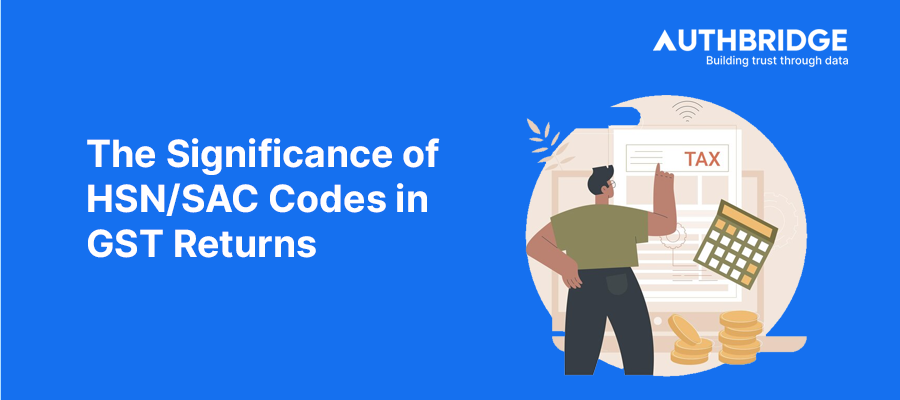HSN/SAC Codes: The Key To Smooth GST Return Filing

The Goods and Services Tax (GST) revolutionized India's indirect taxation landscape by introducing a unified tax system across the country. While simplifying taxation processes in many ways, it also brought about changes in tax filing, invoicing, and compliance procedures. Amongst these crucial elements are HSN and SAC codes, which might seem minor on the surface but carry substantial importance for seamless GST compliance.
What are HSN and SAC Codes?
Understanding the distinction and purpose of HSN and SAC codes is vital for accurate GST filing:
- HSN (Harmonized System of Nomenclature) Codes: Established by the World Customs Organization (WCO), HSN codes are an internationally standardized system for classifying traded goods. They are universally adopted for customs purposes and play a vital role in determining the applicable GST rate for imported and domestically produced goods in India. The standard HSN code structure usually consists of 2, 4, 6, or 8 digits. For example, the HSN code for laptops might be 8471 (broad category) or 8471 30 (more specific category for laptops weighing not more than 8 kg). (Source: https://www.wcoomd.org/)
- SAC (Services Accounting Code) Codes: Developed by the Central Board of Indirect Taxes and Customs (CBIC) specifically for India, SAC codes serve to classify services under the GST regime. These codes follow a 6-digit format, with the first two digits aligning with the broad service category (e.g., 99 for financial and insurance services) and the subsequent digits further specifying the specific service type (e.g., 996331 for luxury hotel accommodation). (Source: https://gstcouncil.gov.in/)
5 Key Reasons Why HSN/SAC Codes are Critical in GST Returns:
- Accurate GST Rate Determination: HSN codes for goods and SAC codes for services are directly linked to the applicable GST rate. For instance, essential commodities like milk powder might fall under the 0% GST slab, while luxury watches could attract a 28% GST rate. By accurately specifying the appropriate HSN/SAC code in your GST returns, you ensure that the correct tax rate is calculated and paid to the government. (Source:https://taxinformation.cbic.gov.in/)
- Smooth Reconciliation Processes: HSN/SAC codes provide a standardized language for both sellers and buyers. When your invoices and GST returns accurately reflect the HSN/SAC codes of the products or services involved, it facilitates easier cross-verification and reconciliation with your suppliers and/or customers. This promotes transparency and reduces the risk of errors or discrepancies during tax audits.
- Transparency and Accountability: Using the correct codes adds an extra layer of transparency to tax filings. They enable tax authorities to easily identify the nature of goods or services supplied, ensuring accurate tax collection, reducing error margins, and deterring potential tax evasion attempts. This fosters a more robust and accountable tax system.
- Compliance Simplification: While the vast number of HSN and SAC codes might seem overwhelming at first, they actually simplify GST compliance for businesses. Having a globally recognized classification system with established tax rates provides a clear framework for businesses to adhere to, minimizing confusion and simplifying the overall filing process.
- International Trade Facilitation: Since HSN codes are an internationally accepted system for classifying goods, incorporating them within the GST ecosystem facilitates smoother cross-border transactions. This translates to reduced customs clearance times, streamlined import/export activities, and ultimately enhances the competitiveness of Indian businesses in the global market. (Source:https://www.cbic.gov.in/)
Finding the Correct HSN/SAC Codes:
Identifying the appropriate HSN/SAC code for your specific products or services is crucial for accurate tax filing. Here are some reliable resources to assist you:
- Government Resources: The CBIC provides comprehensive lists of HSN and SAC codes on their official website (https://www.cbic.gov.in/)
- Professional Guidance: Consulting a qualified tax professional can be highly beneficial, especially for businesses dealing with complex product classifications or specific industry-related considerations.
Conclusion:
HSN and SAC codes, though seemingly simple alphanumeric sequences, play a critical role in ensuring accurate GST compliance. Understanding their significance and taking the time to accurately apply these codes within your GST returns will contribute to:
- Streamlined tax filing processes
- Enhanced transparency and accountability in tax reporting
- Reduced risk of errors and discrepancies during tax audits
- Facilitated reconciliation with suppliers and customers
- Increased efficiency and accuracy in tax collection for the government
- Enhanced competitiveness of Indian businesses in the global market
By actively engaging with these codes and understanding their purpose, businesses can navigate the GST regime with greater confidence and contribute to a more streamlined and efficient tax ecosystem in India.
Here are some additional points to consider:
- Regular Updates: HSN codes are periodically updated by the WCO to reflect changes in global trade patterns and the introduction of new products. It's advisable to stay informed about any updates and ensure your HSN codes are current. You can find updates on the WCO website (https://www.wcoomd.org/).
- GST Rate Changes: GST rates are subject to revisions by the GST Council. Keeping yourself updated on any changes in tax rates applicable to your specific HSN/SAC code categories is crucial to ensure accurate tax calculations and compliance.
- Software Solutions: Several accounting software providers and tax consultants offer solutions that can automate HSN/SAC code identification and integrate seamlessly with GST filing processes. This can significantly reduce manual effort and minimize the risk of errors.
Remember, accurate and timely filing of GST returns is crucial for businesses to avoid penalties and interest charges. By understanding the significance of HSN/SAC codes and utilizing the available resources effectively, you can ensure smooth GST compliance and contribute to a more efficient tax system in India.
Category

Abhinandan Banerjee
(Associate Manager - Marketing)
Abhinandan is a dynamic Product and Content Marketer, boasting over seven years of experience in crafting impactful marketing strategies across diverse environments. Known for his strategic insights, he propels digital growth and boosts brand visibility by transforming complex ideas into compelling content that inspires action.



